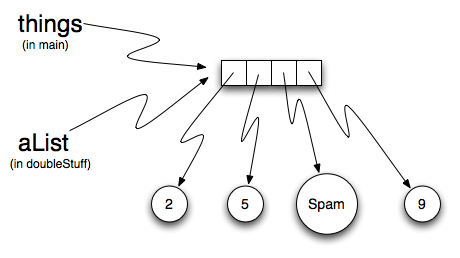10.19. Using Lists as Parameters¶
Functions which take lists as arguments and change them during execution are called modifiers and the changes they make are called side effects. Passing a list as an argument actually passes a reference to the list, not a copy of the list. Since lists are mutable, changes made to the elements referenced by the parameter change the same list that the argument is referencing. For example, the function below takes a list as an argument and multiplies each element in the list by 2:
The parameter aList and the variable things are aliases for the
same object.

Since the list object is shared by two references, there is only one copy. If a function modifies the elements of a list parameter, the caller sees the change since the change is occurring to the original.
This can be easily seen in codelens. Note that after the call to doubleStuff, the formal parameter aList refers to the same object as the actual parameter things. There is only one copy of the list object itself.
Activity: CodeLens 10.19.2 (chp09_parm1_trace)